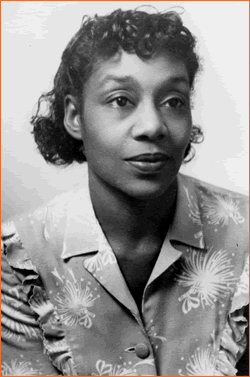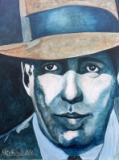Harlem Renaissance
In the early 1920's there was a movement called the "Negro" or "Harlem Renaissance". This resurgence of literature, knowledge, and the arts coming out of New York was powerful.

Dorothy West, an author and journalist, is best known for her work during the Harlem Renaissance. She had once described herself as "the best-known unknown writer of the time," Waiting almost fifty years between her first and second novel, her legacy is her stories that exposed the divisions of racism and classism within African-American society, showing how they undermined relationships and progress.
The child of Rachel Pease Benson and Isaac Christopher West, Dorothy West was born on June 2, 1907 in Boston, Massachusetts. Her father, Isaac West, was a former slave from Virginia. Dorothy's father received his freedom at the age of seven and by ten had saved enough money in a cigar box to start his own business. By the time Dorothy was born they were the wealthiest black family in Boston. Isaac West owned a wholesale fruit company and was known as the "Black Banana King" of Boston.
Her formal education began at age two under the tutelage of Bessie Trotter, sister of Monroe Nathan Trotter, then editor of the Boston Guardian. Dorothy West began writing short stories at the tender age of seven. Her first short story, "Promise and Fulfillment," was published in the Boston Globe, a paper for which West became a regular contributor and that awarded her several literary prizes. After graduating from Girl's Latin High School in 1923, West continued her education at Boston University and later the Columbia University School of Journalism.
In 1926 Dorothy West tied for second prize with Zora Neale Hurston in a contest in Opportunity magazine. Her story, "The Typewriter," won her a trip to New York City. Once she had her taste of the big city, she decided to stay, taking up at the YWCA until she received a fellowship.
In New York, Dorothy West met some of the brightest black artists and writers in the country, including black poets, Langston Hughes and Countee Cullen, vital writers in the Harlem Renaissance. She also developed a friendship with H. L. Mencken. But while many of the writers of that Harlem-based group wrote about the working class, West concentrated on the social divisions well-to-do blacks created based on wealth and skin color.
Starting in 1927, to supplement her writing income, West became involved in acting. That year she found work as an extra in the original stage production of George Gershwin's opera Porgy and Bess . She stayed with the cast for several years, performing on Broadway and then in London.
By 1932, nearly broke and discouraged by publishers' repeated rejections, West joined a group of 20 other black artists and intellectuals, which included Hughes, who traveled to Russia to make a film about racism in the United States. The film was to be titled Black and White . However, when the group reached Russia, the members learned that the production had been canceled. No reason was ever provided. Compounding the problem, group members were accused of being Communist sympathizers. Despite the disappointment and accusations, West liked Russia and stayed there for more than a year. Hughes remained with her. Eventually, West asked Hughes to marry her, but he declined. She finally left Russia to return home in 1933 when she learned that her father had died.
Times were hard for Dorothy West when she arrived back in the United States. The Great Depression had taken its toll and her father's business had failed shortly before his death. In 1934 Dorothy West invested her forty dollar savings and started the literary magazine Challenge in New York City. The magazine's goal was to showcase the talent in both experienced and up and coming African American writers in an attempt to re-capture some of the excitement of the Harlem Renaissance. One emerging black writer, Richard Wright, would later gain fame with his highly acclaimed novel Native Son. West persevered with the magazine for four years, producing six issues, before the publication folded in April of 1937.
Undaunted, she began another publishing venture that same year, teaming up with Wright to create a periodical called New Challenge . But it only lasted for one issue, which was published in 1937. This sole publication was notable for its inclusion of an essay by Wright ("Blueprint for Negro Writing"), as well as the first published work of Ralph Ellison, who would later write the groundbreaking novel Invisible Man.
In 1947 West went back to her family's vacation home on Martha's Vineyard, where she would live for the rest of her life. Once she settled in, she started work on her first novel, The Living is Easy , which was published in 1948. A partly autobiographical work, the novel involved upwardly mobile African Americans and the problems they had assimilating. Although her novel had some critical acclaim, it struggled with any financial success.
Dorothy West took a short story she had started years before and began to transform it into her second novel. She struggled with the book and was ready to give up until her neighbor, Jackie Onassis encouraged her to see it through. The novel, titled The Wedding , was eventually published in 1995. West dedicated it to Onassis, but unfortunately, Onassis died in 1994 before it was released. Set on Martha's Vineyard, The Wedding related the multigenerational tale of a well-to-do African-American family. As with a lot of West's writings, the book provided a somewhat satirical look at affluent blacks and related social and racial issues.
Don't miss a single page. Find everything you need on our complete sitemap directory.
Listen or read the top speeches from African Americans. Read more
Read about the great African Americans who fought in wars. Read more
African Americans invented many of the things we use today. Read more
Thin jazz, think art, think of great actors and find them here. Read more
Follow the history of Black Americans from slave ships to the presidency. Read more
Olympic winners, MVPS of every sport, and people who broke the color barrier. Read more
These men and women risked and sometimes lost their life to fight for the cause. Read more
Meet the people who worked to change the system from the inside. Read more

Visit my RedBubble page and use Michael Arnold Art to create greeting cards, T-shirts, mugs, and more.

The variety and impressive numbers of mammals, birds and marine wildlife in Alaska draw visitors from all over the world. For some travelers, Alaska is wilderness, at least compared to what they may know from back home. The pristine wilderness of Alaska is, perhaps, the last vestige of thriving populations of North American wildlife. Where else can you see polar bears, bald eagles, blue and humpbacked whales, gray wolves, grizzly bears, orcas, lynx, moose, and hundreds of other rare and endangered species in their original and undisturbed natural habitats?

Enjoy our website filled with original signed acrylic paintings by award winning Artist Michael Arnold. Located in Citrus County Florida, Michael Arnold is a the editor at the Citrus County Chronicle. When he's not busy being an editor, he is an avid artist who enjoys painting in a variety of styles. We hope you take the time to click on each image to see a larger view and to learn what the artist, Michael Arnold has to say about his paintings.

As dog owners and people who care deeply for animals and wildlife, we wanted our Dog Encyclopedia to be a website that could empower pet owners to create the most positive, loving environment for their dogs. Dog Encyclopedia realizes that owning a dog is like adding a new member to your family.

Floridian Nature has everything your are looking for in Florida nature. The wildlife of Florida is rich and varied, yet most of us are familiar with only a dozen or so species: the "well known endangered species such as manatees and panthers; those, like raccoons and squirrels, that have adapted to urban environments; the frightening alligators and black bears; and those like the armadillo who can't seem to cross the road. Yet they are just a few of the many animal species found in Florida.
